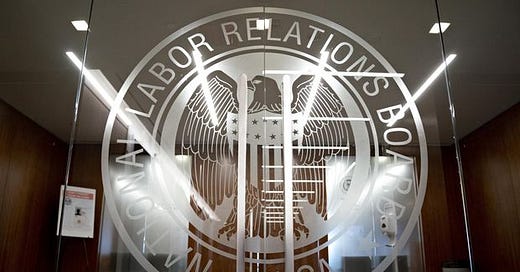The Robb Era: A Knockdown But Not A Knockout For The NLRB
Peter Robb did more than anyone else in history to cripple the agency, but he didn't succeed in killing it.
I don’t plan on writing a summary of Peter Robb’s doctrinal influence on the National Labor Relations Board. We all lived through the endless stream of bad case law, and other organizations have done it better. But I did want to write a quick retrospective of Robb’s tenure while the afterglow of his firing was still fresh.
Robb’s mission in accepting the General Counsel job wasn’t just to reverse Obama Board decisions and create pro-management precedent. It was to destroy the agency as we currently know it. That isn’t hyperbolic; it’s simply the only way to rationally interpret his actions. And it’s important that we acknowledge it.
The NLRB has lost over a quarter of its field staff since Robb came aboard. He declined to hire virtually any replacements for those lost to attrition. This wasn’t because of a lack of resources, as the Inspector General has investigated why Robb and (out-going) Chairman John Ring “mistakenly” failed to spend millions of dollars allotted to the agency by Congress. Without any major closing of regional or even subregional offices, Robb was discretionarily refusing to hire the manpower necessary to enforce federal labor law across the country.
Of course, it was originally Robb’s intention to bring about those closings. As Bloomberg Law reported in detail in early 2018, Robb had told the Regional Directors just months into his term that he was contemplating a tectonic shift in the agency’s structure, which would have included the merging of regions and closing of offices in pursuit of a vague “super region” district idea. These districts would have been overseen by a small group of “district directors” who reported directly to the General Counsel. The Regional Directors were to be demoted from their rank in the Senior Executive Service.
This would have been a massive centralization of a notoriously decentralized agency, putting the most power into D.C. headquarters since the Labor Board was meticulously grooming test cases in the fight for its own constitutionality during the Great Depression. Since the 1940s, the regions have mostly been able to operate with remarkable levels of autonomy, bowing to broader political shifts but retaining control of most day-to-day functions and filings. So the stakes of Robb’s power-grabbing proposal were clear: during Republican presidential administrations, the NLRB would basically take a four-year hiatus. Whatever regions remained under the district model would be completely micro-managed by Washington and beholden to its whims.
Luckily, the proposal drew a massive backlash internally among civil servants and externally in the press. Robb eventually abandoned it, perhaps realizing how gargantuan the task was, especially considering that Trump was never a shoe-in or even a favorite for re-election. Instead of enacting historic reform of the agency, Robb simply went back to his original task of gutting it from the inside, offering unwarranted buyouts to experienced staff and pleading poor from hypothetical budget cuts that never materialized. The regional offices became ghost towns, over half of them carrying vacancies in critical supervisor positions that bogged down enforcement of the law.
This sort of blatant sabotage was what ultimately led to Robb’s demise. Never before has a Republican holdover in the GC’s office earned the axe from an incoming Democratic president, but no GC before Robb had ever made it a singular focus of their term to emaciate the agency and its employees’ unions. Indeed, in examining LM-3 reports filed with the the Department of Labor, the NLRBU barely shed any members during Bush’s administration pre-recession; at worst, the losses were comparable to those under Obama. So Biden probably isn’t a more ruthless political operator than Obama, who declined to fire Bush’s General Counsel (or even consider it). Biden was just handed a terminal case.
I believe that distinction is critical. Robb’s firing is being described as a political power play by Biden, and maybe it is in some respect. But it was more so an action to protect the agency from permanent incapacitation. In that respect, yesterday’s events were more defense than they were offense. (And as much as some in the labor relations community want to pretend it doesn’t, the National Labor Relations Act explicitly encourages the spread and institutionalizing of collective bargaining as the official economic policy of the United States. No GC before Robb had ever so blatantly defied this mandate.)
As it is, the NLRB will stumble out of the Robb era with half the personnel it boasted 20 years ago. It is a diminished agency, but its skeletal frame remains intact. Staff can be hired. Its budget can be increased. And its regions can remain free from conservative fiefdom when the next Robb comes around. But all of this will require a tremendous amount of time and energy on the part of congressional Democrats. Hopefully the last three years have convinced them is a battle worth fighting.




